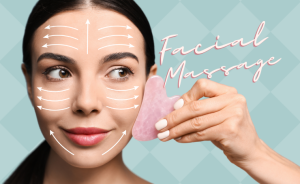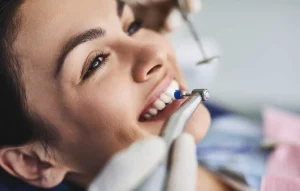Pregnancy can bring about various hormonal changes in a woman’s body, which can sometimes lead to the development of acne. This condition is commonly known as “pregnancy acne” or “pregnancy-related acne.”
The hormonal fluctuations that occur during pregnancy can stimulate the sebaceous glands in the skin to produce more oil, which can clog the pores and result in the formation of acne. Additionally, the increased production of hormones, such as progesterone, can contribute to the development of acne by causing the skin to become more sensitive and reactive to bacteria.
Here are some tips to help manage acne during pregnancy:
- Maintain a consistent skincare routine: Use a gentle cleanser to wash your face twice a day. Avoid harsh or abrasive scrubs that can further irritate the skin. Be sure to choose skincare products labeled as non-comedogenic, meaning they won’t clog your pores.
- Avoid excessive oil and makeup: Minimize the use of heavy oil-based cosmetics and opt for oil-free or water-based makeup products. Avoid touching your face throughout the day, as it can transfer dirt and oil to your skin.
- Stay hydrated and maintain a healthy diet: Drinking plenty of water can help keep your skin hydrated and flush out toxins. A balanced diet rich in fruits, vegetables, and whole grains can also contribute to healthy skin.
- Don’t squeeze or pick at acne lesions: It’s important to resist the temptation to squeeze or pick at acne, as this can lead to inflammation, scarring, and potential infection.
- Consult a dermatologist: If your acne is severe or causing significant distress, consider consulting a dermatologist who can provide personalized advice and treatment options. Some prescription medications may be safe to use during pregnancy, so it’s essential to consult a healthcare professional who can guide you appropriately.
Remember, pregnancy acne is usually temporary and tends to resolve on its own after childbirth as hormone levels stabilize. In the meantime, taking care of your skin and implementing good skincare practices can help minimize its impact.

Introduction
Pregnancy is a transformative period in a woman’s life, accompanied by various physiological changes. While many women experience the “pregnancy glow” due to increased blood flow and hormonal changes, others may encounter the unwelcome presence of pregnancy pimples. Pregnancy pimple, also known as pregnancy-related acne, is a common dermatological condition that affects many expectant mothers. This essay will explore the causes of pregnancy acne, its impact on women during this period, and strategies for managing and treating the condition effectively.
Body:
Causes of Pregnancy Acne
During pregnancy, a woman’s body undergoes significant hormonal fluctuations, which can contribute to the development of acne. Understanding the underlying causes is crucial in managing and treating pregnancy acne effectively. The main factors contributing to pregnancy pimples are:
- Hormonal Changes: Pregnancy causes an increase in hormone production, particularly estrogen and progesterone. While these hormones are necessary for a healthy pregnancy, they can also stimulate the sebaceous glands in the skin to produce more oil. The excess oil can clog pores and lead to the formation of acne.
- Increased Sebum Production: Hormonal imbalances during pregnancy can result in the overproduction of sebum, an oily substance that helps moisturize the skin. Excessive sebum production can lead to oily skin, clogged pores, and acne breakouts.
- Sensitivity to Bacteria: Pregnant women often experience an increased sensitivity to bacteria on the skin. This heightened sensitivity can cause the immune system to react more strongly to the presence of bacteria, triggering inflammation and acne formation.
Impact of Pregnancy Acne on Expectant Mothers
Pregnancy pimples can have physical, emotional, and psychological effects on expectant mothers. Understanding the impact of this condition is crucial for providing support and effective management strategies. The following are some common effects of pregnancy pimples :
- Physical Discomfort: Acne breakouts can be physically uncomfortable, causing itching, tenderness, and pain. The presence of acne lesions on the face, neck, and other areas can negatively impact a woman’s self-esteem and body image during this transformative period.
- Emotional Distress: Pregnancy is already an emotionally charged time, and dealing with acne can add to the emotional distress. Women may experience feelings of self-consciousness, embarrassment, and lowered self-confidence due to the appearance of acne. This emotional burden can affect their overall well-being and enjoyment of the pregnancy experience.
- Psychological Impact: Pregnancy pimples can also lead to psychological effects such as anxiety and stress. Women may worry about the long-term effects of acne on their skin or fear that their acne will not subside after pregnancy. These concerns can contribute to increased stress levels, potentially affecting both the mother’s mental health and the overall pregnancy experience.

Managing and Treating Pregnancy pimples
Managing pregnancy pimples involves a combination of preventive measures, skincare practices, and, in some cases, medical interventions. The following strategies can help expectant mothers effectively manage and treat pregnancy pimples:
- Gentle Skincare Routine: Adopting a consistent and gentle skincare routine is essential in managing acne during pregnancy. Use a mild, non-comedogenic cleanser twice a day to remove excess oil and impurities from the skin. Avoid harsh scrubs or abrasive products that can irritate the skin and worsen acne.
- Oil-Free and Non-Comedogenic Products: Choose oil-free or water-based makeup and skincare products labeled as non-comedogenic. These products are less likely to clog pores and contribute to acne breakouts.
- Hydration and Healthy Diet: Staying hydrated by drinking an adequate amount of water promotes overall skin health. A healthy diet rich in fruits, vegetables, whole grains, and lean proteins can also support skin health and reduce inflammation.
- Avoid Touching and Picking: Resist the urge to touch or pick at acne lesions, as this can worsen inflammation, lead to scarring, and potentially result in infection.
- Natural Remedies: Some natural remedies, such as tea tree oil or aloe vera gel, may provide relief for mild acne during pregnancy. However, it is important to consult with a healthcare professional or dermatologist before using any new products or remedies.
- Consult a Dermatologist: If pregnancy pimples is severe, persistent, or causing significant distress, it is advisable to consult a dermatologist. A dermatologist can provide personalized advice and prescribe safe topical treatments or medications suitable for use during pregnancy.
- Stress Management: Engaging in stress management techniques, such as meditation, yoga, or deep breathing exercises, can help reduce stress levels and potentially improve acne symptoms.
Conclusion
Pregnancy acne, although a common occurrence, can have a significant impact on expectant mothers. The hormonal changes during pregnancy contribute to the development of acne, which can cause physical discomfort, emotional distress, and psychological burden. However, with appropriate management strategies, pregnancy pimples can be effectively controlled. Maintaining a gentle skincare routine, using non-comedogenic products, staying hydrated, and following a healthy diet are essential steps in managing pregnancy acne. It is important to avoid picking or squeezing acne lesions and to seek professional guidance from a dermatologist if needed. Additionally, managing stress levels through relaxation techniques can also contribute to improving acne symptoms. By implementing these strategies, expectant mothers can minimize the impact of pregnancy pimples, promote their overall well-being, and focus on enjoying the transformative journey of pregnancy.










